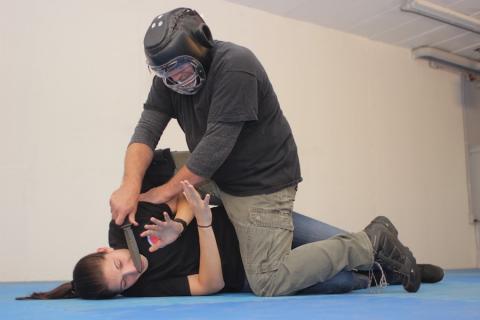The Fight
January 18, 2021
Fights are not static. Things move. People move. Bear-hugs and headlocks and all that stuff happen sometimes in a fight, but they are transitional actions. You do not get bear-hugged just to be held (except by bouncers). A Threat wraps his big arms around you from behind either to pick you up and shake you (disorienting and intended as an intimidating show of strength) or to drive you into a wall. Maybe to throw you over a balcony. If you practice technique-based defense, will they work if the Threat refuses to stand there? If he is using that headlock to slam you from wall to wall?
The Lowest Level of Force
December 7, 2020
The Records area at Rusafa Prison Complex in Baghdad is enclosed by a chain-link fence and was almost always crowded. It’s a stressful place, with inmates being processed in and out, Iraqi military, police, corrections, advocates, politicos, and sometimes families of the convicts are present and a small handful of American advisors.
Tai Chi—A Tradition of Immunity and Health - Part 1
May 18, 2020
The question many may be asking is if tai chi may protect you from the coronavirus or other conditions. More research would be needed to determine this, and it is important for legal reasons to avoid making any claims that tai chi is a cure for any condition. But the preliminary research related to benefits for immunity and other conditions at least offers hope for enhanced health. And hope in many ways has been considered by many to be one of the best medicines. As noted by Orison Swett Marden, author and founder of Success Magazine, “There is no medicine like hope, no incentive so great, and no tonic so powerful as expectation of something tomorrow.” Here is hoping for a better tomorrow through tai chi.
Metarobics for Immunity
May 4, 2020
Researchers have also looked at the effects of tai chi practice on virus-specific lymphocytes. A study examining the effects of tai chi on varicella zoster (shingles) virus-specific lymphocytes found a significant increase in the number of these lymphocytes in a group of older adults after fifteen weeks of tai chi training. The tai chi group experienced an almost 50 percent increase in cell-mediated immunity to the varicella zoster virus despite not receiving the vaccine, compared to no change in a comparison group. A third group received the shingles vaccine, which resulted in a 75 percent increase in the number of virus-specific lymphocytes.
Tai Chi, Metarobics, and Immunity
February 17, 2020
Tai chi practice has been shown to have beneficial effect on T cells. In a study conducted at the Chang Gung Institute of Technology in Taiwan, 12 weeks of tai chi practice resulted in a significant increase in regulatory T Cells. Monocytes (large white blood cells) also decreased significantly. Lower Monocyte counts are an indication of good health, since Monocytes increase in response to infection and chronic inflammation, indicating poor health.
Maximizing Metarobic Effects
-
December 16, 2019
Those forms of exercise that focus on relaxation, efficient movement, and slow, deep breathing yield consistently higher blood oxygen saturation levels, as well as feelings of enhanced oxygen diffusion. This includes relaxation- and breath-focused forms of qigong and yoga. Since one of the drawbacks of traditional formats of tai chi is the long learning curve, I developed an easy-to-follow format. This format consisted of shifting the feet back and forth in place through the range of movements found in tai chi, focusing on movements that maximize Metarobic effects.
Metarobics, Tai Chi and Alzheimer’s
-
June 10, 2019
Alzheimer’s is a scary disease. To go from having memories and full mental functioning to not knowing who you are, a decline in mental and physical functioning, and eventual death—what can be scarier than that? And as a disease, Alzheimer’s is becoming increasingly prevalent. According to the Centers for Disease Control, death rates from Alzheimer’s disease increased 55 percent between 1999 and 2014. Approximately one-third of all people age 85 and older may have Alzheimer's disease. Although genes and environment can play a factor, much of the growth of Alzheimer’s may be linked to a more sedentary lifestyle.
Tips for Selecting a Tai Chi Class
-
January 14, 2019
To learn or practice tai chi for health, teaching ability can make more difference than the years of experience a teacher has in tai chi. This was also something hard for me to admit as a longtime practitioner. There are many traditionalists with a more martial orientation who may have incredible skill in tai chi but little patience as teachers. One of the largest barriers to learning tai chi identified in a survey of major programs in the United States was lack of patience on the part of the instructor.
Essential Elements of Metarobics and Tai Chi for Therapy
-
September 17, 2018
Tai chi is fast becoming a popular exercise, resulting in a wide range of teaching methods. Some changes are beneficial, but others may reduce or even eliminate the unique benefits of tai chi. This chapter provides a brief overview of the development of tai chi for health and discusses what to look for when choosing a class to maximize the benefits of tai chi from a Metarobic and structural perspective.
Metarobics and Tai Chi: How a Student with Cancer Changed My Understanding of Exercise
-
August 20, 2018
My awareness of how the body responds to certain kinds of movement occurred over a period of several years, and quite by accident. It was a gradual process. It began with the first student who came to me convinced that tai chi had cured her cancer. Over time, I came to realize that a large variety of chronic diseases shared a common element—an element directly affected by tai chi and similar exercises, which have unique and measurable effects on blood oxygen saturation and diffusion.
Tai Chi, Metarobics and World Tai Chi & Qigong Day
-
April 23, 2018
Every year thousands around the globe celebrate and promote tai chi on World Tai Chi & Qigong Day (WTCQGD). This event was founded almost 20 years ago by Bill Douglas, as a way to promote interest in these exercises. And it worked. Every year many schools who participate in this event bring in new students. And I am excited to announce that this may get even better – new research and the release of my book Mindful Exercise: Metarobics, Healing, and the Power of Tai Chi, byYMAA, August 2018, holds promise for attracting even more to these health and life giving arts.
Simple Drills Worth Knowing
-
January 30, 2017
The following are important things, some little, some major, that lend themselves well to simple drills or exercises. Backing up is almost never the answer. Unless you are excellent at reading and remembering tactical terrain, you might not know what or who is behind you.
Preparation for Beginning a Tai Chi Sequence
-
January 5, 2017
Before you begin the sequence it is good to stand in wuji for a moment to focus your intent and your qi.
Evaluating Drills—Part 2
-
October 31, 2016
I get especially annoyed with weapons. Unarmed defense against a weapon sucks. Never, ever, ever practice dying and do not train to be killed. The stakes are too high to blindly imprint a habit, even a habit as simple as handing a weapon back once you have disarmed someone.
Evaluating Drills—Part 1
-
October 24, 2016
I'm not a big fan of most drills. There is a fine line, but conditioned reflexes are crucial in a fight and habits will get you killed. Conditioned reflexes are things you do without thinking about it. They are essentially trained flinch responses. If something suddenly comes at your eyes you WILL do something: block, move your head or, at the very minimum, blink.
DRILL: The One-Step
-
September 26, 2016
The one-step arose as a useful accident. Many years ago I was reading George Mattson's The Way of Karate and I completely misunderstood his description of ippon kumite.
Not Parlor Tricks
-
September 12, 2016
The following aren't actually tricks. They are exercises that you demonstrate once to show a deeper truth. Most will not work on people a second time. Some will learn to game it.
DRILL: The One-Step
-
August 29, 2016
The one-step arose as a useful accident. Many years ago I was reading George Mattson's The Way of Karate and I completely misunderstood his description of ippon kumite. I thought, "That's brilliant—unscripted but safe, just looking at this whole thing as a meat geometry problem…"
Training for Sudden Violence
-
August 15, 2016
I teach about violence. As I left “the life” I discovered that my niche wasn’t so much teaching cops as I had expected, or even teaching civilian self-defense. The material seemed to resonate most with experienced martial artists who were coming to discover how little they really knew about violence.
Introduction of Yang Style Lao Liu Lu Taijiquan
-
August 8, 2016
In the time of Qing Dynasty, taijiquan was quite popular in the royal palace due to Prince Pu Lun Bei Zi, a man of great power and wealth, who appreciated the fighting technique of Yang-style taijiquan. He recognized the martial applications disguised in the slow, graceful movements, as if there were needles hidden, wrapped in cotton.
Self-Defense: A Unique Teaching Challenge
-
June 27, 2016
There are six very important distinctions that make self-defense different from almost every other subject we teach. Rarity. Emergencies are extremely rare, complex, and varied. Rarity means there is very limited experience available on how to deal with such an event.
Taijiquan and Buddhadharma
-
May 30, 2016
The three dharma seals in Buddhadharma: impermanence, non-self, and nirvana. In the sutras it is said that whatever is phenomenal is impermanent, everything is of non-self, and nirvana is perfect tranquility.
Hooks in Violent and Non Violent Encounters
-
January 12, 2016
Dealing with people who routinely used violence to get what they want, they often sought a "hook." A hook is an excuse to act out or a rationalization that will allow them to excuse their actions later.
Safety In Practicing Taijiquan
-
August 10, 2015
Is there a safety issue for practicing taijiquan? Yes. I occasionally listen to a program on learning taijiquan while in my car. A host once asked his guest (a famous master of taijiquan), "What physical conditions are required for learning taijiquan?" The guest answered: "You can learn taijiquan as long as your knees are fine."
Boundary Setting—Society's Rules
-
August 3, 2015
One of the advantages of living in society with a set of rules and mores is that the boundaries are supposed to be set for you. In a homogenous society everyone has similar ideas of right and wrong, appropriate and inappropriate. The rules say who you can and can't touch and how, what you can and can't say and to whom.
























